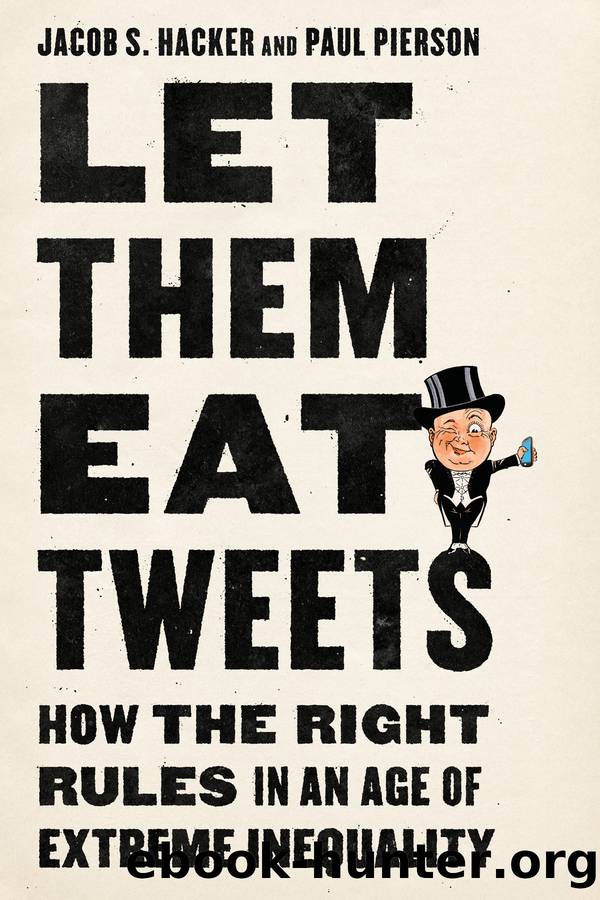Let them Eat Tweets by Jacob S. Hacker

Author:Jacob S. Hacker
Language: eng
Format: epub
Publisher: Liveright
Published: 2020-03-30T00:00:00+00:00
Chapter 5
A VERY CIVIL WAR
IN MOST ACCOUNTS OF THE 2016 ELECTION and its aftermath, Donald Trump tears down the old GOP and remakes it in his image. A standard trope is that the GOP establishment—whether by “establishment” one means prominent elected officials or the loose association of formidable organized interests that bankroll the GOP and mobilize its supporters—went to battle with Trump, and lost. Trump won the Republican base, forced equivocating politicians to declare their allegiance, and swept all before him. In the words of Paul Ryan, “The Trump wing beat the Reagan wing.”1
The journeys of the vanquished varied. Some, including the commentators David Frum, William Kristol, and George Will, became “Never-Trumpers,” going into exile and quickly losing any influence they once had on the right. Some joined Trump when it became clear he would win the party’s nomination. Then there were the “November 9thers” who studiously refused to endorse Trump but switched to the winning side after his upset victory in the general election. Still others—Senators Bob Corker and Jeff Flake, for instance—attempted to maintain some distance and preserve their options. Corker and Flake soon left politics, followed by Paul Ryan himself, and it was the closure of this last path that signaled, to many observers, the end of the party’s civil war. In the new GOP, public officials either bent their knee to Trump, retired from the scene, or were demolished.
Yet if the past few years have witnessed a Republican civil war, it has been a very civil war, in which the side allegedly losing has made gains it could have scarcely contemplated just a few years before. Among the biggest winners were right-wing plutocrats who had been at the heart of the establishment. When Trump took power, he handed much of that power to people loyal to these plutocrats, or to the plutocrats themselves. They brought their long-standing policy ambitions into the federal government and carried them out with a vengeance.
This plutocratic agenda was, and is, extraordinarily unpopular, and its unpopularity is a reminder of the fundamental clash between the priorities of the party’s power elite and the interests of its voters. In two-party democracies, parties aren’t supposed to pursue high-profile policies with only minority backing, much less policies that impose disproportionate suffering on people who give the party disproportionate support. Yet the self-styled tribune of workers in the White House has done just that, his embrace of economic elites even tighter than that of the last Republican president, George W. Bush.
The plutocrats have gotten huge tax cuts. They have reaped the benefits of an unprecedented attack on regulations that police big corporations and protect consumers, workers, and the environment. And they have seen the nation’s powerful courts tilt even further in favor of elite economic interests. Looking back on the first year of the Trump presidency, establishment Republican and plutocrat ally Mitch McConnell pronounced it to be “the best year for conservatives in the thirty years that I’ve been here [in the Senate] . . . the best year on all fronts.
Download
This site does not store any files on its server. We only index and link to content provided by other sites. Please contact the content providers to delete copyright contents if any and email us, we'll remove relevant links or contents immediately.
The Secret History by Donna Tartt(18054)
The Social Justice Warrior Handbook by Lisa De Pasquale(11930)
Thirteen Reasons Why by Jay Asher(8398)
This Is How You Lose Her by Junot Diaz(6401)
Weapons of Math Destruction by Cathy O'Neil(5779)
Zero to One by Peter Thiel(5444)
Beartown by Fredrik Backman(5293)
The Myth of the Strong Leader by Archie Brown(5204)
The Fire Next Time by James Baldwin(4985)
How Democracies Die by Steven Levitsky & Daniel Ziblatt(4932)
Promise Me, Dad by Joe Biden(4890)
Stone's Rules by Roger Stone(4818)
100 Deadly Skills by Clint Emerson(4647)
Rise and Kill First by Ronen Bergman(4527)
A Higher Loyalty: Truth, Lies, and Leadership by James Comey(4520)
The David Icke Guide to the Global Conspiracy (and how to end it) by David Icke(4348)
Secrecy World by Jake Bernstein(4342)
The Farm by Tom Rob Smith(4294)
The Doomsday Machine by Daniel Ellsberg(4220)
